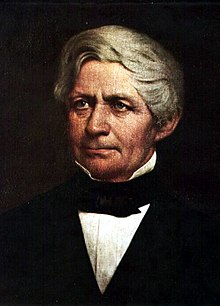Johann Hinrich Wichern
Johann Hinrich Wichern | |
|---|---|
 |
Johann Hinrich Wichern (21 April 1808 Hamburg - 7 April 1881 Hamburg) was a founder of the Home Mission (also translated as Inner Mission; German: Innere Mission) movement in Germany.
Biography
Wichern studied theology at Göttingen and Berlin, and, settling in Hamburg, devoted himself to missionary work among the poor. He became head teacher of a Sunday school in St. Georg which proved very successful, and in 1833 opened his Rauhes Haus at Horn, now a suburb of Hamburg. Wichern became especially known for recruiting and training a corps of "brothers" who helped educate and discipline wayward boys and men and tend to the needs of the poor. He founded hostels across Germany that were supposed to provide a refuge, free of alcohol and gambling, to journeymen and other travelers. In his writings and speeches, Wichern promoted the ideal of Christian voluntarism to assist the poor, criminals, and disabled[1] and heal the class and political divides in Germany surrounding the Revolution of 1848 (which he loathed). [2][3] He is also credited with inventing the (now traditional) Advent wreath in 1839.[4] In 1844, he founded a monthly periodical, Fliegende Blätter des Rauhen Hauses, which he edited.[3]
Through his exertions, the Protestant synod at Wittenberg in 1848 appointed a central committee for home missions. In 1851 the Prussian government made him inspector of prisons and houses of correction, and in 1858 member of the Supreme Ecclesiastical Council, the executive authority of the Evangelical State Church in Prussia. In 1872 disease forced him to retire from office.[2]
Writings
- Die innere Mission der deutschen evangelischen Kirche (“The inner mission of the German Evangelical Church,” 1849)
- Die Behandlung der Verbrecher und entlassenen Sträflinge (“The handling of criminals and the discharge of prisoners,” 1853)
- Festbüchlein des Rauhen Hauses (3 vols., 1856)
- Der Dienst der Frauen in der Kirche (“Women's service in the church,” 1858)
- Unsere Lieder (“Our songs,” 4th ed., 1870)
See also
References
- ^ Warren Rosenblum, Beyond the Prison Gates, (UNC Press 2008)
- ^ a b Gilman, D. C.; Peck, H. T.; Colby, F. M., eds. (1905). . New International Encyclopedia (1st ed.). New York: Dodd, Mead.
- ^ a b Ripley, George; Dana, Charles A., eds. (1879). . The American Cyclopædia.
- ^ "Christmas customs and recipes", Bayern Tourismus Marketing GmbH
